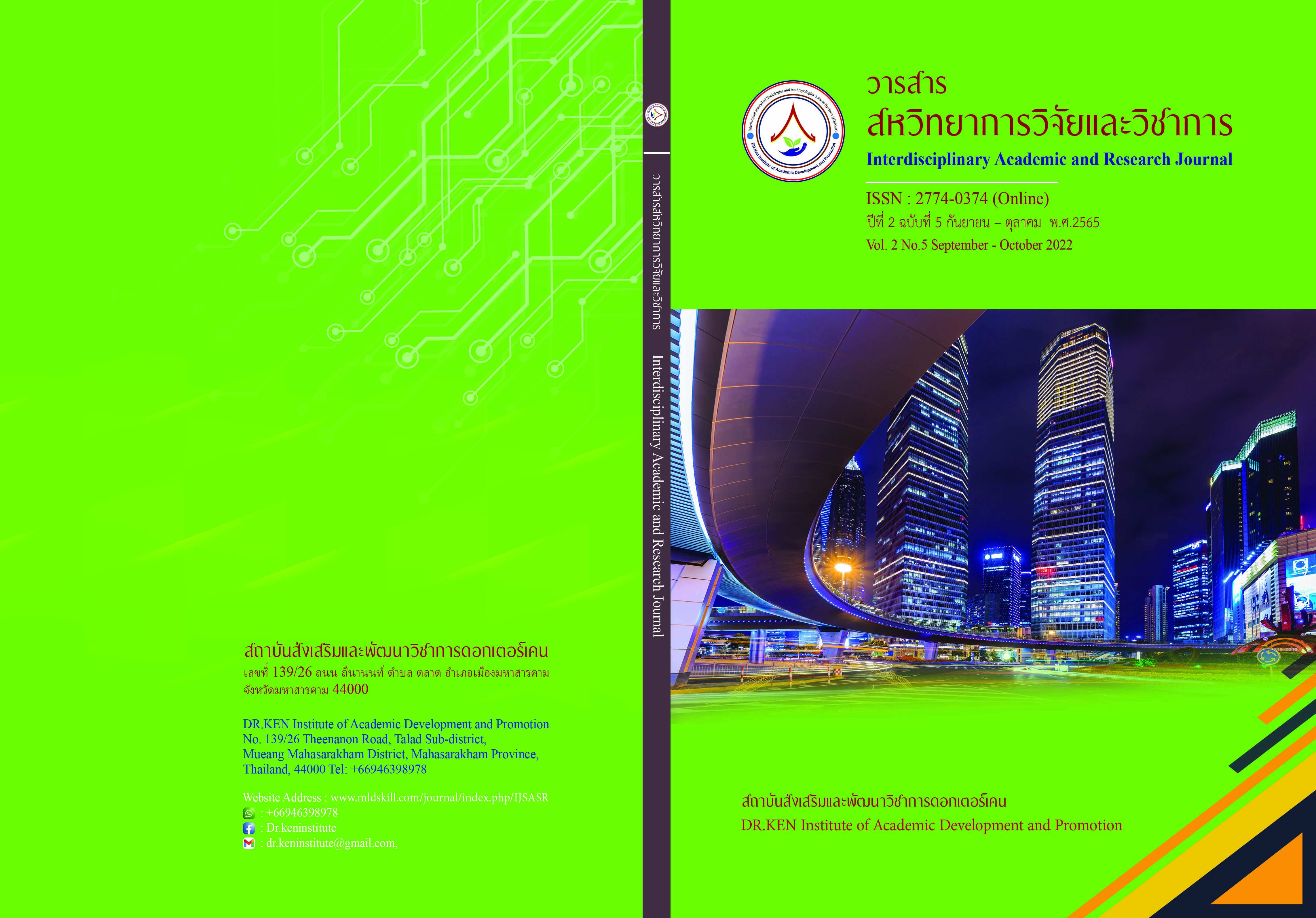School Management Model of Learning Center According to the Sufficiency Economy Philosophy in Education towards Sustainable Quality Development, Ban Pak Moo School, Nong Khai Primary Educational Service Area Office 2
DOI:
https://doi.org/10.14456/iarj.2022.87Keywords:
Sufficiency Economy Philosophy; , Management Model; , Learning CenterAbstract
Learning management according to the Sufficiency Economy Philosophy is the application of principles and theories of the Sufficiency Economy Philosophy as a guideline in formulating management policies and teaching and learning to achieve sustainability in terms of quality of education, life and environment. The objectives of this research were 1) to study the current conditions, problems and needs of school management and learning centers according to the philosophy of sufficiency economy in education towards sustainable quality development, 2) to create a model for managing schools and learning centers according to the philosophy of sufficiency economy in education towards sustainable quality development, 3) to study the results of the experimental model of school management and learning centers according to the philosophy of sufficiency economy in education towards sustainable quality development, and 4) to study the results of the experimental model of school management and learning centers according to the philosophy of sufficiency economy in education towards sustainable quality development. The samples used in this research were 5 teachers, 8 basic education committees, 33 students, and 33 students' parents. The research instruments consisted of 1) a questionnaire on current conditions, problems and needs, 2) an interview form, 3) a school management model of a learning center based on the philosophy of sufficiency economy in education, 4) a satisfaction questionnaire, and 5) a quiz. The statistics used in the data analysis were percentage, mean, standard deviation, and content analysis. The statistic used to test the hypothesis is t-test (Dependent Samples). The results of the research found that; (1) The results of the analysis of the current condition as a whole were at a high level when considering each aspect, it was found that the assessment results were at a high level on 2 aspects and at a moderate level on 4 aspects. The results of the analysis of overall problems were at a moderate level when considering each aspect, found that the assessment results were at a high level on 2 aspects and at a moderate level on 4 areas. The results of needed analysis were at the highest level when considering each aspect, found that it was at the highest level in all aspects. (2) School management model of learning center according to the Sufficiency Economy Philosophy in education towards sustainable quality development has 6 components: 1) Sufficiency personnel, 2) Sufficiency environment, 3) Sufficiency community, 4) Sufficiency innovation, 5) Sufficiency budget, and 6) Sufficiency network building. The results of the model evaluation by experts had an average of 4.61, the highest level. (3) The result of the experiment using the school management model of learning center according to the Sufficiency Economy Philosophy in education towards sustainable quality development was mean 4.35 at a high level. (4) The result of the satisfaction questionnaire on the school management model of learning center according to the Sufficiency Economy Philosophy in education towards sustainable quality development was mean 4.27 at a high level. And (5) The comparative result of the comprehension test scores on the philosophy of sufficiency economy of the training to extend the results to network schools after training was significantly higher than before the training at the.01 level.
References
กระทรวงศึกษาธิการ. (2556). คู่มือการบริหารโรงเรียนในโครงการพัฒนาการบริหารรูปแบบนิติบุคคล. กรุงเทพฯ: กระทรวงศึกษาธิการ.
จักรปรุฬห์ วิชาอัครวิทย์. (2559). รูปแบบการจัดการเรียนการสอนตามหลักปรัชญาของเศรษฐกิจพอเพียงในจังหวัดเชียงใหม่. เชียงใหม่ : มหาวิทยาลัยราชภัฏเชียงใหม่.
จำเริญรัตน์ จิตต์จิรจรรย์. (2559). การพัฒนารูปแบบการประยุกต์ใช้ปรัชญาของเศรษฐกิจพอเพียงเพื่อพัฒนาตนเองในการศึกษาของนักศึกษาสถาบันอุดมศึกษาในภาคตะวันออกเฉียงเหนือ. วารสารวิชาการ สมาคมสถาบันอุดมศึกษาเอกชนแห่งประเทศไทย. 22 (2), 47-60.
ณสิตา อรัญยะพันธุ์. (2552).การบริหารจัดการศึกษาตามหลักปรัชญาเศรษฐกิจพอเพียงในสถานศึกษาสังกัดสำนักงานเขตพื้นที่การศึกษานนทบุรี เขต 2. กรุงเทพ: มหาวิทยาลัยธุรกิจบัณฑิต.
ธนธรรม มีทอง. (2552). การบริหารจัดการสถานศึกษาตามแนวคิดเศรษฐกิจพอเพียง :กรณีศึกษาโรงเรียนบ้านรองแซง. การศึกษาคนควาอิสระศึกษาศาสตรมหาบัณฑิตสาขาการบริหารการศึกษามหาวิทยาลัยขอนแก่น.
นวรัตน์ ทองน้อย. (2553). การบริหารสถานศึกษาตามหลักปรัชญาของเศรษฐกิจพอเพียง โรงเรียน วัดลากะดาน สานักงานเขตคลองสามวา กรุงเทพมหานคร. [Online] สืบค้นจากhttp://www.loysaianusornschoolcomBook1234htm?b_id=77891&bcat_id=16. [10 มิถุนายน 2564]
บุญเอื้อ หงส์วิชา. (2554). การประยุกต์ใช้หลักเศรษฐกิจพอเพียงในการดำเนินชีวิตของบุคลากรทางการศึกษา ในสังกัดโรงเรียนพระปริยัติธรรมแผนกสามัญศึกษา จังหวัดร้อยเอ็ด. วิทยานิพนธ์มหาบัณฑิต บัณฑิตวิทยาลัย มหาวิทยาลัยมหามกุฏราชวิทยาลัย.
พัชฎา วะไลใจ. (2553). การศึกษาปัญหาการจัดการศึกษาตามหลักปรัชญาของเศรษฐกิจพอเพียง ในโรงเรียนสังกัดสานักงานเขตพื้นที่การศึกษาชลบุรี เขต 2. งานนิพนธ์การศึกษา มหาบัณฑิตสาขาวิชาการบริหารการศึกษาคณะศึกษาศาสตร์มหาวิทยาลัยบูรพา.
พิชญาดา สิงหเลิศ. (2560). การบริหารสถานศึกษาตามหลักปรัชญาเศรษฐกิจพอเพียงของโรงเรียนในสหวิทยาเขตระยอง 2 สังกัดสำนักงานเขตพื้นที่การศึกษามัธยมศึกษา เขต 18. งานนิพนธ์การศึกษามหาบัณฑิต สาขาวิชาการบริหารการศึกษา คณะศึกษาศาสตร์ มหาวิทยาลัยบูรพา.
พิพัฒน์ แก้วใส. (2557). การนำแนวคิดหลักปรัชญาเศรษฐกิจพอเพียงไปใช้ในโรงเรียนประถมศึกษาสำนักงานเขตลาดกระบังสังกัดกรุงเทพมหานคร. วิทยานิพนธ์ครุศาสตรมหาบัณฑิต มหาวิทยาลัยราชภัฏราชนครินทร์.
โรงเรียนบ้านปักหมู. (2563). รายงานผลการประเมินตนเองของสถานศึกษา (SELF-ASSESSMENT REPORT : SAR) ปีการศึกษา 2563. หนองคาย: โรงเรียนบ้านปักหมู.
วรนุช ปานคุ้ม. (2560). การจัดทำแผนกลยุทธ์การพัฒนาสถานศึกษาพอเพียงเพื่อเป็นศูนย์การเรียนรู้ตามหลักปรัชญาของเศรษฐกิจพอเพียงด้านการศึกษาของโรงเรียน ราชประชานุเคราะห์ 13 จังหวัดอุตรดิตถ์.วิทยานิพนธ์ปริญญาศึกษาศาสตรมหาบัณฑิต สาขาวิชาการศึกษา การบริหารการศึกษา บัณฑิตวิทยาลัย มหาวิทยาลัยเชียงใหม่.
วรางคนาง ชูแก้ว. (2553). การพัฒนาโมเดลเชิงสาเหตุของคานิยมและพฤติกรรมตามปรัชญาของเศรษฐกิจพอเพียงของนักเรียนมัธยมศึกษา. วารสารเทคโนโลยีสุรนารี, 4 (2), 1-16.
วาโร เพ็งสวัสดิ์. (2553). สถิติประยุกต์สำหรับการวิจัยทางสังคมศาสตร์. กรุงเทพฯ: สุวิริยสาส์น.
สมใจ สิกขวัฒน์, วรรณะ บรรจง และ สถาพร สังข์ขาวสุทธิรักษ์. (2557). การบริหารสถานศึกษาตามหลักปรัชญาเศรษฐกิจพอเพียงที่มีต่อการเสริมสร้างคุณลักษณะอันพึงประสงค์ของนักเรียนสังกัดสำนักงานเขตพื้นที่การศึกษาประถมศึกษาสุราษฎร์ธานีเขต 1. วารสารครุพิบูล. 1 (1), 1-11.
สมชาย ทวีทรัพย์. (2557). รูปแบบการบริหารโรงเรียนแบบมีส่วนร่วมตามหลักปรัชญาของเศรษฐกิจพอเพียงโรงเรียนบ้านหนองเตย. ศรีสะเกษ: โรงเรียนบ้านหนองเตย.
สมรภูมิ อ่อนอุ่น. (2557). แนวทางการบริหารสถานศึกษาตามหลักปรัชญาของเศรษฐกิจพอเพียงของโรงเรียนมัธยมศึกษาในจังหวัดตาก สังกัดสานักงานเขตพื้นทีการศึกษามัธยมศึกษาเขต 38. วิทยานิพนธ์ครุศาสตรมหาบัณฑิต มหาวิทยาลัยราชภัฏนครสวรรค์.
สำนักงานคณะกรรมการการศึกษาขั้นพื้นฐาน. (2563). นโยบายสำนักงานคณะกรรมการการศึกษาขั้นพื้นฐาน ปีงบประมาณ พ.ศ.2563. กรุงเทพฯ.: สำนักงานคณะกรรมการการศึกษาขั้นพื้นฐาน กระทรวงศึกษาธิการ.
สำนักงานคณะกรรมการพัฒนาเศรษฐกิจและสังคมแห่งชาติ. (2559). สรุปสาระสำคัญแผนพัฒนาเศรษฐกิจและสังคมแห่งชาติ ฉบับที่สิบสอง พ.ศ. 2560-2564.กรุงเทพฯ: สำนักงานคณะกรรมการพัฒนาเศรษฐกิจและสังคมแห่งชาติสำนักนายกรัฐมนตรี.
สำนักงานทรัพย์สินส่วนพระมหากษัตริย์. (2555).จากปรัชญาเศรษฐกิจพอเพียงสู่การปฏิบัติ กว่า 1 ทศวรรษ.กรุงเทพฯ: สำนักงานทรัพย์สินส่วนพระมหากษัตริย์.
สิริรัชต์ แก้วงาม. (2561). การพัฒนารูปแบบการยกระดับผลสัมฤทธิ์ทางการเรียน ของนักเรียนโรงเรียนบ้านฉู่ฉี่ สังกัดสำนักงานเขตพื้นที่การศึกษาประถมศึกษาสมุทรสงคราม. สมุทรสงคราม: โรงเรียนบ้านฉู่ฉี่.
อรวรณ ป้อมดำ. (2561). การขับเคลื่อนศูนย์การเรียนรู้ ตามหลักปรัชญาของเศรษฐกิจพอเพียงในสถานศึกษาสังกัดสานักงานเขตพื้นที่การศึกษาประถมศึกษาลพบุรี เขต 2. กรุงเทพฯ:สานักงานคณะกรรมการการศึกษาขั้นพื้นฐาน กระทรวงศึกษาธิการ.
Downloads
Published
How to Cite
Issue
Section
License
Copyright (c) 2022 Sujitra Pongkose

This work is licensed under a Creative Commons Attribution-NonCommercial-NoDerivatives 4.0 International License.
Copyright on any article in the Interdisciplinary Academic and Research Journal is retained by the author(s) under the under the Creative Commons Attribution-NonCommercial-NoDerivatives 4.0 International License. Permission to use text, content, images, etc. of publication. Any user to read, download, copy, distribute, print, search, or link to the full texts of articles, crawl them for indexing, pass them as data to software, or use them for any other lawful purpose. But do not use it for commercial use or with the intent to benefit any business.
















.png)


